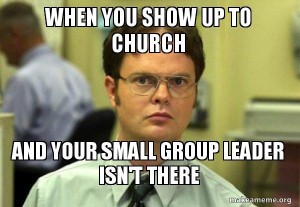3 Ways To Make A Difference As Small Group Leader
We moved to a new city when my oldest daughter was in Kindergarten. And when we looked for a church home, one of the most important things for us was location. We wanted a church close enough that it wouldn’t be intimating to invite our neighbors. Now, while this effort was noble, I didn’t take into account some other things. This church had so many qualities that we liked—inclusive, modern music, applicable teaching, small groups for most ages and a fun children’s environment. This seemed to fit our family for a while—and yes, we were right that our neighbors weren’t intimated to attend with us.
But after a couple of years, Sunday mornings began to feel like a war zone. Both daughters would cry at the sheer mention that we were going to church. I didn’t get it. They had friends there. They did crafts. They ate snacks. They sang songs. All things that they love. Yet, they screamed like someone was killing their favorite animal each week.
Here’s what I realized was missing—small group leaders. For the children’s ministry, each grade was considered a classroom with volunteers. Someone checked attendance. Someone read the Bible story. Someone helped with the craft. Most weeks, there were 36 kids and 4 adults in the room. Even if they were small group leaders, that would put 9 kids per adult. To make it worse, each week was a different volunteer in the room. No consistency. No one to remember my daughter. No one for my daughter to expect to see which caused major anxiety for her.
What I began to realize was that my oldest, now at age 8, was in desperate need of a small group leader. She needed to know that someone was waiting and looking for her each week. She needed someone who was going to ask her about her life—stresses, school, friends, family. She needed to know who to expect to see each week. The truth is that she wasn’t the only one who needed this. I needed her to have a small group leader. I needed someone who would say the same thing that I would say. It’s not a knock against me personally. I’m not going to stop speaking truth in my daughter’s life. But I know from my own experience the value of other voices. Sometimes it takes someone else speaking the truth for it to stick.
Here is what I have learned from seeing my daughter’s needs:
- Be consistent.
Show up each week. I know that is asking a lot, but investing in the next generation is no small task. When you show up, it speaks volumes to the kid and the parent. When you show up each week, a kid knows who to expect which elevates anxiety of the unknown.
- Ask questions.
One of the greatest things you can do as a small group leader is to learn to ask questions that create a dialog. Sure, you will have a set list of questions to ask about the bible story, but learn to ask questions about their world. Asking questions shows interest. “What was your high/low this week?” “What was something funny that happened at school this week?” “Was there any strange smells in the cafeteria?” “What’s something you look forward to next week?” These types of questions begin to tear down barriers and set you up for a better dialog about the bible story and set up a greater sense of trust between you and the kid. When you have the change in your pocket from learning about their life, you will be at a better place to speak truth into their world.
- Remember.
When a kid opens up to you and the group, remember what’s going on with them. And when you see them again, ask them about that specific thing. Doesn’t it make you feel loved when someone remembers something that was important to you? Kids are no different. Remember the recital, big game, test, struggle with anxiety. The more you remember, the greater the relationship you build.
So, dear small group leader, you are highly valuable. What you do as a small group leader is no small feat and it doesn’t go unnoticed. You make a difference by showing up early. You make a difference by asking questions. You make a difference by speaking the truth in a way that makes sense to someone their age. You make a difference by remembering what happened in a kid’s life.
Thank you for serving!

